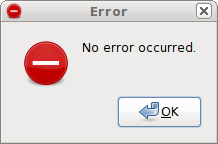False assumptions with MySQL
Posted by cafuego on Friday 19 June 2009.I spent far too much time this past week trying to find out why a Drupal was not assigning authenticated user permissions to users who clicked on the validation link they were emailed. Instead, it would simply remove the temporary unverified user permission.
It's supposed to do the latter, but then also follow it up with the former. It turns out the problem was a Drupal bug that was triggered by my MySQL setup.

 Since I'm a fan of the reliability and automated recovery that InnoDB provides, I use it for all the Drupals that I host. However, on a very busy site, this may lead to deadlocks. These in turn lead to users seeing errors, which is something I'd like to avoid. Especially if the error could be prevented.
Since I'm a fan of the reliability and automated recovery that InnoDB provides, I use it for all the Drupals that I host. However, on a very busy site, this may lead to deadlocks. These in turn lead to users seeing errors, which is something I'd like to avoid. Especially if the error could be prevented.